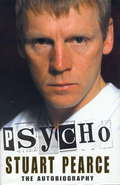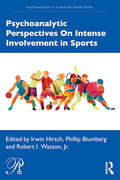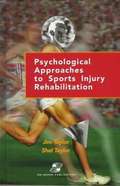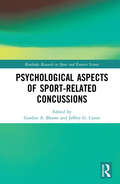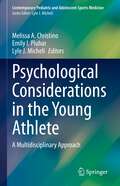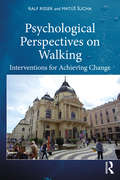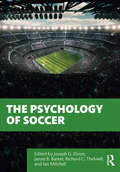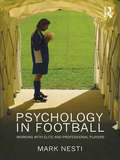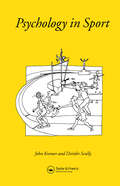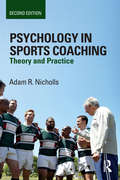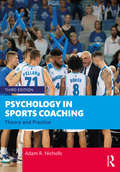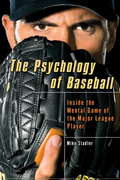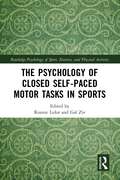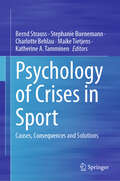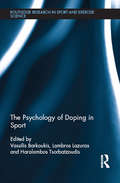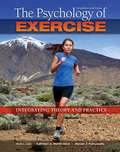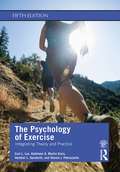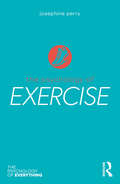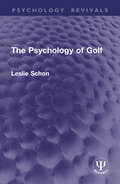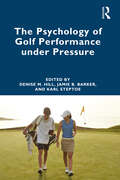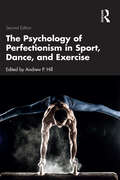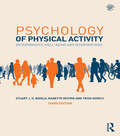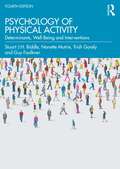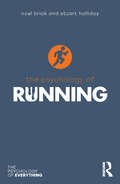- Table View
- List View
Psycho: The Autobiography
by Stuart PearceIn an era of superstar prima donnas, Stuart Pearce's total commitment on the pitch earned him the affection of football fans everywhere, who nicknamed him Psycho. He will forever be remembered for two penalties - one missed and scored - for England, but there is so much more to him than that. This book reveals the fascinating story of one of football's greatest personalities. PSYCHO is as honest and straightforward as the man himself.
Psycho: The Autobiography
by Stuart PearceIn an era of superstar prima donnas, Stuart Pearce's total commitment on the pitch earned him the affection of football fans everywhere, who nicknamed him Psycho. He will forever be remembered for two penalties - one missed and scored - for England, but there is so much more to him than that. This book reveals the fascinating story of one of football's greatest personalities. PSYCHO is as honest and straightforward as the man himself.
Psychoanalytic Perspectives On Intense Involvement in Sports (Psychoanalysis in a New Key Book Series)
by Irwin HirschThis book is a unique volume that brings a variety of psychoanalytic perspectives to the study of sport. It highlights the importance of sports for different individuals and how the function and use of sports can be brought into the consulting room. Passionate interest in actively engaging in sports is a universal phenomenon. It is striking that this aspect of human life, prior to this volume, has received little attention in the literature of psychoanalysis. This edited volume is comprised largely of psychoanalysts who are themselves avidly involved with sports. It is suggested that intense involvement in sports prioritizes commitment and active engagement over passivity and that such involvement provides an emotionally tinged distraction from the various misfortunes of life. Indeed, the ups and downs in mood related to athletic victory or defeat often supplant, temporarily, matters in life that may be more personally urgent. Engaging in sports or rooting for teams provides a feeling of community and a sense of identification with like-minded others, even among those who are part of other communities and have sufficient communal identifications. This book offers a better psychoanalytic understanding of sports to help us discover more about ourselves, our patients and our culture, and will be of great interest to psychotherapists and psychoanalysts, or anyone with an interest in sport and its link to psychoanalysis and mental health.
Psychological Approaches to Sports Injury Rehabilitation
by Jim Taylor Shel TaylorIn dedicating this guide for rehabilitation specialists, consultants J. Taylor and S. Taylor (U. of Connecticut Health Center, Farmington) refer to frustration and patience as well as to pain and expertise, recognizing that bouncing back from sidelining sports injuries entails mind as well as body. Augmented by celebrity soundbites, the authors detail the referral process for assessing psychological problems; mental influences on rehabilitation (motivation, anxiety, focus); facilitatitive techniques (imagery, using negative thinking positively, pain management, social support); return to the sport; and development of a psychological rehab program (with sample forms, program prescription summaries). Annotation c. by Book News, Inc., Portland, Or.
Psychological Aspects of Sport-Related Concussions (Routledge Research in Sport and Exercise Science)
by Gordon A. Bloom Jeffrey G. CaronRecognition of concussion as a serious injury, informed by neurological and physiological research, is now commonplace in sport. However, research on the psychology of concussive injury—its psychological implications and outcomes, and psychological interventions for prevention and recovery—has largely been overlooked. This is the first book to explicitly and authoritatively set out the psychological aspects of sport-related concussion from a multidisciplinary and global perspective <P><P>The book attempts to offer a global understanding of the injury by presenting an historical overview; exploring the psychological implications of sport-related concussion and the influence of gender and sociocultural context on concussive injury and recovery; setting out practical guidance on working with special populations suffering from concussive injuries; and discussing the theoretical and methodological considerations for research on concussion and future directions for this research. <P><P>Written by a group of leading international experts and offering a hitherto underdeveloped perspective on this crucial area of sports injury research, this book is crucial reading for any upper-level student, researcher, sport scientist, coach, or allied health professional working on sport-related concussion. It is also valuable reading for students and researchers interested in the psychosocial processes that impact injury and recovery or general professional practice in sport psychology.
Psychological Considerations in the Young Athlete: A Multidisciplinary Approach (Contemporary Pediatric and Adolescent Sports Medicine)
by Melissa A. Christino Emily I. Pluhar Lyle J. MicheliThis book provides a broad and multidisciplinary review of psychological aspects of sport participation that are important to consider in young athletes. It discusses the many psychosocial benefits of sports, describes common mental health and body image issues pediatric athletes may suffer from, explains the psychological effects of injury and surgery on young athletes and the importance of mind-body connection, and advocates for safe sport participation and a multidisciplinary approach to the care of young athletes. This is the first text to discuss the psychological implications of sport participation in young athletes – a critical topic in today’s sport landscape that is often underappreciated and understudied. Bringing together contributions from prominent sports psychologists, sports medicine physicians and surgeons, coaches, and pain management specialists, Psychological Considerations in the Young Athlete combines the most up-to-date research, and serves as a valuable resource for clinicians, therapists, and athletic trainers who serve pediatric and adolescent athletes and sports teams.
Psychological Perspectives on Walking: Interventions for Achieving Change
by Ralf Risser Matúš ŠuchaPsychological Perspectives on Walking provides a comprehensive overview of the benefits of walking and shows how we can encourage people to walk more based on psychological principles. It examines how walking significantly improves health, positively impacts the environment, contributes to resolving social issues, and boosts the local micro-economy. This pioneering book discusses psychological motivations for walking versus not walking and asserts research-based arguments in favour of walking, including both theoretical considerations and everyday concerns. The book investigates the motivations that can lead to increased walking, advises on how to build walking-conducive habits, and recommends strategies for decision makers for promoting changes that will allow walking to thrive more easily. The authors include success stories and lessons learned from what have become known as 'walkable' cities to show how interventions and initiatives can succeed on a practical basis. This accessible, practical book is essential for urban planners; health specialists; policy makers; traffic experts; psychology, civil engineering, and social sciences students; and experts in the field of sustainable mobility. Psychological Perspectives on Walking will appeal to anyone in the general population in favour of a sustainable and healthy lifestyle.
Psychology in Elite Soccer: More Than Just a Game
by Joseph G. DixonSports psychology; exploring the effects of psychological interventions on important performance-related outcomes, has become ever more popular and prevalent within elite level soccer clubs in the past decade as teams look to gain psychological as well as physiological advantages over their competitors. Psychology in Elite Soccer; More Than Just a Game seeks to present ta detailed understanding of the theories underpinning the psychological issues relating to soccer along with practical insights into effective psychological interventions and strategies This book uses contemporary theory and research to elucidate key concepts and applied interventions and will include world-leading expert commentaries of contemporary theoretical and applied approaches in understanding critical issues in soccer along with providing practical implications and insights into working effectively in soccer-related contexts. Psychology in Elite Soccer; More Than Just a Game is an evidence-based resource to guide research and facilitate practice and will be a vital resource for researchers, practitioners and coaches within the area of sport psychology and related disciplines.
Psychology in Football: Working with Elite and Professional Players
by Mark NestiHow can the skills of the sport psychologist be put to best use within a football club? How can a sport psychologist help elite footballers perform at their maximum level? In this groundbreaking guide to the role of the sport psychologist within elite and professional football, leading sport psychologist Mark Nesti argues that working closely with coaches and players to create a receptive environment is vital if psychologists are to add maximum value to team and individual performances. Drawing on a decade’s professional experience working at the top level of English football, Nesti offers a detailed guide to delivering sport psychology in an elite team sport environment, from practical drills on the training field to shaping organizational behaviour at club level. The book explores the full range of issues and themes that define the role of the professional sport psychologist working in football today, including: mental skills training group cohesion and team dynamics counselling, trust and confidentiality transitions in football managerial and coaching philosophies structure, communication and organizational psychology. The book is illustrated throughout with real-world case studies, drawing on research into sixteen professional clubs across five European countries, and concludes by suggesting how other elite team sports can learn from the experiences of professional football. This is the only book to outline a holistic approach to psychology in football and the to offer such a rich combination of theory and practice. It is therefore essential reading for all students of sport psychology and all psychologists and coaches working in elite team sport.
Psychology In Sport (Contemporary Psychology Ser.)
by John M.D Kreme Deirdre ScullyPsychology in Sport aims to bring sport psychology closer to the heart of mainstream psychology. John Kremer and Deirdre Scully take a new and refreshing look at the most recent sport psychology literature, presenting this information in a way which will be immediately recognisable to students of psychology. Written in a clear and engrossing style, this new approach to Psychology in sport will be of immediate relevance to courses on introductory, applied and sport psychology, as well as providing a valuable reference source for general psychological material pertaining to sport and exercise.
Psychology in Sports Coaching: Theory and Practice
by Adam R. NichollsSome of the most effective coaches understand the fundamentals of sport psychology, which include interacting effectively with athletes, creating the optimal environment, assessing the psychological needs of their athletes, and even providing them with the mental training required to maximise performance. Fully revised and updated, the second edition of Psychology in Sports Coaching: Theory and Practice clearly and accessibly introduces the principles and practice of sport psychology in the context of the coaching process. Drawing on the very latest research and theory, the book introduces the psychological tools and techniques that coaches can use to get the best performances out of their athletes. Including six new chapters on applying self-determination principles in coaching, creating the optimal motivational climate, increasing motivation, developing anti-doping attitudes, promoting challenge states, and mindfulness-based stress reduction training, the book also offers step-by-step guidance on key topics such as: Assessing the needs of athletes Facilitating awareness through goal-setting and performance profiling Working with special populations, including children and injured athletes Building team cohesion Maximising relationships and socially supporting athletes Teaching mental skills such as imagery and coping Building mental toughness and confidence. Every chapter contains useful features to aid learning and understanding, including in-depth case studies, critical thinking questions, clear and concise summaries, and practice exam questions. Psychology in Sports Coaching: Theory and Practice is essential reading for any student of sports coaching or any practising coach looking to extend and develop their skills, and useful applied reading for students of sport psychology.
Psychology in Sports Coaching: Theory and Practice
by Adam R. NichollsThe most effective coaches understand the fundamentals of sport psychology, which include interacting effectively with athletes, creating the optimal environment, assessing the psychological needs of their athletes, and providing them with the mental training required to maximise performance. Fully revised and updated, the third edition of Psychology in Sports Coaching clearly and accessibly introduces the principles and practice of sport psychology in the context of the coaching process. Drawing on the very latest research and theory, the book introduces the psychological tools and techniques that coaches can use to get the best performances out of their athletes. Including three new chapters on the constraints approach to assessing psychological needs, mental imagery, managing perfectionism tendencies, and mentoring leaders, the book also offers step-by-step guidance on key topics such as: Assessing the needs of athletes Facilitating awareness through goal setting and performance profiling Coaching specialist populations effectively (e.g. children, adolescents, adults and athletes with learning disabilities) Reducing favourable attitudes towards doping Developing effective coach-athlete relationships Reducing choking under pressure Mindfulness techniques Mental imagery Every chapter contains useful features to aid learning and understanding, including in-depth case studies, critical thinking questions, clear and concise summaries, and practice exam questions. Psychology in Sports Coaching is essential reading for any student of sports coaching, or any practising coach looking to extend and develop their skills, and useful applied reading for students of sport psychology.
The Psychology of Baseball
by Mike StadlerGet inside the minds of the stars of the diamond in this extraordinary tour of brain power, psyche, and sheer will. Yogi Berra once said, "Baseball is 90 percent mental. The other half is physical. " Even so, the Yankee great may have underestimated the brain power professional baseball players routinely draw on to perform such astounding feats of athleticism as hitting 98-mph fastballs and diving to catch line drives. In The Psychology of Baseball, Mike Stadler goes beneath the surface of the game to explore the psychology behind the actions of the game's greats-and breaks down legendary moments from baseball history, such as Willie Mays's full-sprint over-the-shoulder grab in the 1954 World Series. Stadler begins with the mind's role in the game's basic skills, explaining the anticipatory thinking that can make a hitter see a "rising fastball," the complex muscular coordination required to throw a major league heater, and the intense spatial calculations the brain must perform in a split second in order for a fielder to catch a struck ball. Stadler then discusses the hidden nature of streaks and slumps, explaining why a "hot" hitter is most likely just getting lucky and why there's no such thing as a clutch hitter, and also looks at the psychological basis of the so-called "sophomore slump" and the effect that a big-money contract has on a player's performance. He also examines the personality types that are best suited to baseball, and explains what traits are most associated with success at the highest levels. A revolutionary new look at America's pastime that will appeal to the many fans of bestsellers like Moneyballand Three Nights in August, The Psychology of Baseballis a must-read book for the serious baseball fan.
The Psychology of Closed Self-Paced Motor Tasks in Sports (Routledge Psychology of Sport, Exercise and Physical Activity)
by Ronnie LidorIn practice settings, competitions, and games, athletes are often required to perform an arsenal of motor tasks in dynamic and challenged sporting environments, where they have to respond without having enough time to prepare themselves for the act. However, in many sport activities athletes also perform closed self-paced motor tasks – tasks that take place in a relatively stable and predictable environment, where there is adequate time to prepare for their execution. Among these tasks are free-throw shots in basketball, putting in golf, serving in tennis, and bowling. In these tasks, performers are able to plan their actions in advance. They can activate a plan, a strategy, a protocol, or a procedure – what we term a ritual behavior. Effective rituals are usually achieved with a high degree of consistency. That is, either deliberately or subconsciously they become an integral part of the act itself. The Psychology of Closed Self-Paced Motor Tasks in Sports explores those plans, procedures, protocols, strategies, and techniques that aim at facilitating the performance and learning of closed self-paced motor tasks. Included in the instructional-psychological routines discussed in this book are pre-performance routines, focusing attention, motor imagery, enhanced expectancies, autonomy support, gaze strategies, self-talk, and periodization. The routines discussed in the book are evidence-based. Based on updated reviews of laboratory and field inquiries on the discussed instructional-psychological routines, practical implications are given for those professionals who teach closed self-paced motor tasks, including coaches, instructors, and sport psychology consultants.
Psychology of Crises in Sport: Causes, Consequences and Solutions
by Bernd Strauss Stephanie Buenemann Charlotte Behlau Maike Tietjens Katherine A. TamminenThe book includes ideas and concepts from psychology in general, particularly sport psychology, and communication sciences, as well as applied sport psychology and case studies. In each chapter, the reader will first learn the theoretical and empirical background of concepts related to crises, and second, they will be introduced to how to apply this knowledge and methods to prevent and cope with crises. Throughout the book, well-known examples and case studies are addressed to gain a full understanding of crises.
The Psychology of Doping in Sport (Routledge Research in Sport and Exercise Science)
by Vassilis Barkoukis Lambros Lazuras Haralambos TsorbatzoudisThis is the first book to draw together cutting-edge research on the psychological processes underlying doping use in sport and exercise, thereby filling an important gap in our understanding of this centrally important issue in contemporary sport. Covering diverse areas of psychology such as social cognition, automatic and controlled processes, moral decision-making, and societal and contextual influence on behaviour, the book also explores methodological considerations surrounding doping assessment in psychological research as well as future directions for evidence-based preventive interventions and anti-doping education. Written by a team of leading international researchers from countries including the US, Canada, Australia, the UK, Greece, Germany, Italy, Denmark and Ireland, the book integrates empirical findings with theoretical guidance for future psychological research on doping, and illuminates the challenges, needs and priorities in contemporary doping prevention. It is important reading for advanced students and researchers in sport and exercise science, sport management and sport policy, and will open up new perspectives for professional coaches, sports administrators, policy makers and sport medicine specialists looking to better understand the doping behaviours of athletes in sport.
The Psychology of Exercise: Integrating Theory and Practice
by Curt L. Lox Kathleen A. Martin Ginis Steven J. PetruzzelloThe Psychology of Exercise: Integrating Theory and Practice, fourth edition, continues to weave together theory, research, application, and interventions to provide readers with a solid foundation in exercise psychology. In this comprehensive, accessible, book, the authors apply prominent theories and models to actual situations encountered professionally. Compelling graphs, models, other visuals, and effective pedagogical aids further enhance the material. The chapters in Part I help readers understand and modify exercise behavior, while those in Part II discuss psychosocial influences and the consequences of physical activity. Among the topics explored are the impact of exercise on self-perceptions, including self-esteem and body image; stress, anxiety, and depression; and emotional well-being. Chapters on the relationship between physical activity and cognitive function as well as health-related quality of life offer the latest information for these areas of study. Features of the Fourth Edition New streamlined chapter on self-perceptions and exercise, which combines previous chapters on self-esteem and body image. This more logical presentation of related topics makes it easier to teach these topics and better depicts their intersection. Refocused chapter on health-related quality of life and exercise, to include more emphasis on special populations and demonstrate how exercise can benefit those who have chronic diseases, chronic disabilities, or physical limitations. Discussions throughout on mobile devices, apps, social media, and high-tech point-of-decision and how these technologies can be used for tracking and measuring physical activity and for offering social support. Updated references, glossary, and graphics. Special Features of the Book Reader-friendly price Outstanding author team of active researchers with diverse areas of expertise End-of-chapter review questions and learning activities to enhance understanding Connections between theory and application throughout Focus boxes, with additional learning activities, highlighting research on physical activity and populations with chronic disease and disability Standardized questionnaires, including some of the most frequently used measures in exercise psychology research
The Psychology of Exercise: Integrating Theory and Practice
by Curt L. Lox Kathleen A. Martin Ginis Heather L. Gainforth Steven J. PetruzzelloNow in its fifth edition, The Psychology of Exercise: Integrating Theory and Practice is the ideal resource for undergraduate courses devoted to the study of exercise behavior. Following the success of previous editions, this book successfully integrates theoretical principles and the latest research with intervention strategies that students can apply in real-world settings. Students will find multiple forms of presentation throughout including graphics and models, questionnaires and other instruments, focus boxes highlighting research on the impact of physical activity on specific populations, and review questions and activities to enhance learning. This edition includes a substantial revision of the theory and intervention chapters, with a focus on the most popular theories currently thriving in the field, a discussion of environmental and policy influences on behavior, and an expanded presentation of intervention components, design, and evaluation. Separate chapters are also dedicated to popular topics such as personality, self-perceptions, stress, anxiety, depression, emotional well-being, cognitive function, and health-related quality of life. For those seeking to learn more about exercise behavior, The Psychology of Exercise: Integrating Theory and Practice is a must-have resource.
The Psychology of Exercise (The Psychology of Everything)
by Josephine PerryWhy should we exercise? When should we exercise? Why don’t we exercise? The Psychology of Exercise separates fact from fiction, delving into key theories, ideas, and the impact of life stages on when, why, and how we exercise. It explores the barriers and motivators to exercise for children, teenagers, adults, and retirees as well as for those living with a chronic health condition. It shows how when we personalise activity programmes, exercise becomes a life-affirming, life-lengthening habit. Using real-life case studies from those who work with exercisers at all levels, The Psychology of Exercise shows us the huge value that comes from exercising in every stage of our lives.
The Psychology of Golf (Psychology Revivals)
by Leslie SchonFirst published in 1922, The Psychology of Golf examines the mental side of golf from the point of view of the player, and the author’s whole aim is to assist and interest both the expert and the novice. The game of golf is nine-tenths mental and this book attempts to develop those mental skills in a golf player.
The Psychology of Golf Performance under Pressure
by Denise M. Hill Jamie B. Barker Karl SteptoeThe Psychology of Golf Performance under Pressure offers contemporary, research-informed information regarding the key psychological factors affecting golf development and performance under pressure. Through the authors’ substantive expertise – all of whom are notable scholars and/or practitioners in the field of golf psychology – the text provides a highly accessible “real world” application of theory to practice, through the provision of evidence-based guidance regarding how to maximise golf performance under pressure. Golf is a sport that has embraced sport psychology, with many of the highest ranked players in the world (male and female) openly working with a sport psychologist and advocating their importance. As a result, an increasing number of high-profile practitioners are working full-time within the sport around the world, encouraging trainee sport psychology practitioners to pursue their career within golf. Accordingly, there is an ever-increasing demand for high-quality information pertaining to the psychological demands of golf; the key psychological variables that affect golfing development and performance; and evidence-based strategies which enable effective golf performance under pressure. This novel text provides a comprehensive portrayal of the psychological factors which enable effective golfing development and optimal performance under pressure. A theoretical review of the pertinent psychological factors followed by the practical application of theory for the provision of “take home messages” will ensure that this book is of value, interest, and benefit for golfers, coaches, golf organisations, and even the parents of golfers, alongside sport psychology scholars, students, practitioners, and researchers alike.
The Psychology of Perfectionism in Sport, Dance, and Exercise
by Andrew P. HillThis extensively revised and updated edition offers a comprehensive account of the latest research and practice issues relating to perfectionism in sport, dance, and exercise. The new edition of The Psychology of Perfectionism in Sport, Dance, and Exercise includes the latest understanding of perfectionism, its benefits and costs, and support that can be given to those at risk to the perils of perfectionism. The book features contributions from leading researchers and practitioners. With nine new chapters and six updated chapters, the book provides an exhaustive account of research, novel approaches to studying and working with perfectionism, along with critical reflections on key issues and controversies. The book includes a new section on emerging approaches and concepts, as well as a revised section on applied issues and practitioner perspectives offering three new approaches to working with perfectionism. With chapters featuring returning authors and new contributors with novel perspectives, this edition will be invaluable to individuals familiar and unfamiliar with this area of work. This book will be an essential resource and vital guide for students and researchers, as well as practitioners, coaches and instructors in sport, dance, and exercise.
Psychology of Physical Activity: Determinants, Well-Being and Interventions
by Stuart J. Biddle Nanette Mutrie Trish GorelyThe positive benefits of physical activity for physical and mental health are now widely acknowledged, yet levels of physical inactivity continue to increase throughout the developed world. Understanding the psychology of physical activity has therefore become an important concern for scientists, health professionals and policy-makers alike. Psychology of Physical Activity is a comprehensive and in-depth introduction to the fundamentals of exercise psychology, from theories of motivation and adherence to the design of successful interventions for increasing participation. Now in a fully revised, updated and expanded third edition, Psychology of Physical Activity is still the only textbook to offer a full survey of the evidence-base for theory and practice in exercise psychology, and the only textbook that explains how to interpret the quality of the research evidence. With international cases, examples and data included throughout, the book also provides a thoroughly detailed examination of the relationship between physical activity and mental health. A full companion website offers useful features to help students and lecturers get the most out of the book during their course, including multiple-choice revision questions, PowerPoint slides and a test bank of additional learning activities. Psychology of Physical Activity is the most authoritative, engaging and up-to-date introduction to exercise psychology currently available. It is essential reading for all students working in exercise and health sciences.
Psychology of Physical Activity: Determinants, Well-Being and Interventions
by Stuart J. Biddle Nanette Mutrie Trish Gorely Guy FaulknerThe positive benefits of physical activity for physical and mental health are now widely acknowledged, yet levels of physical inactivity continue to be a major concern throughout the world. Understanding the psychology of physical activity has therefore become an important issue for scientists, health professionals and policy-makers alike as they address the challenge of behaviour change. Psychology of Physical Activity provides comprehensive and in-depth coverage of the fundamentals of exercise psychology, from mental health, to theories of motivation and adherence, and to the design of successful interventions for increasing participation. Now publishing in a fully revised, updated and expanded fourth edition, Psychology of Physical Activity is still the only textbook to offer a full survey of the evidence base for theory and practice in exercise psychology, and the only textbook that explains how to interpret the quality of the research evidence. As the field continues to grow rapidly, the new edition expands the behavioural science content of numerous important topics, including physical activity and cognitive functioning, automatic and affective frameworks for understanding physical activity involvement, new interventions designed to increase physical activity (including use of new technologies), and sedentary behaviour. A full companion website offers useful features to help students and lecturers get the most out of the book during their course, including multiple-choice revision questions, PowerPoint slides and a test bank of additional learning activities. Psychology of Physical Activity is the most authoritative, engaging and up-to-date book on exercise psychology currently available. It is essential reading for all students working in behavioural medicine, as well as the exercise and health sciences.
The Psychology of Running (The Psychology of Everything)
by Noel Brick Stuart HollidayWhy do people run? How can I improve my running performance? Will running help me feel better? The Psychology of Running provides a unique insight into why running is such a popular form of exercise and competition. From evolutionary perspectives on why humans have needed to run and how our bodies have adapted for this function, to discussing evidence-based interventions that can improve running performance, the book delves into the psychological motivations and benefits of running. The book also considers ways in which running can be used for social change and life skill development, highlighting how such a simple activity can have benefits for our physical and mental health. Providing proven psychological strategies and techniques to help improve running performance and boost our individual self-belief, The Psychology of Running shows us how we can enjoy running, no matter our age or ability.
